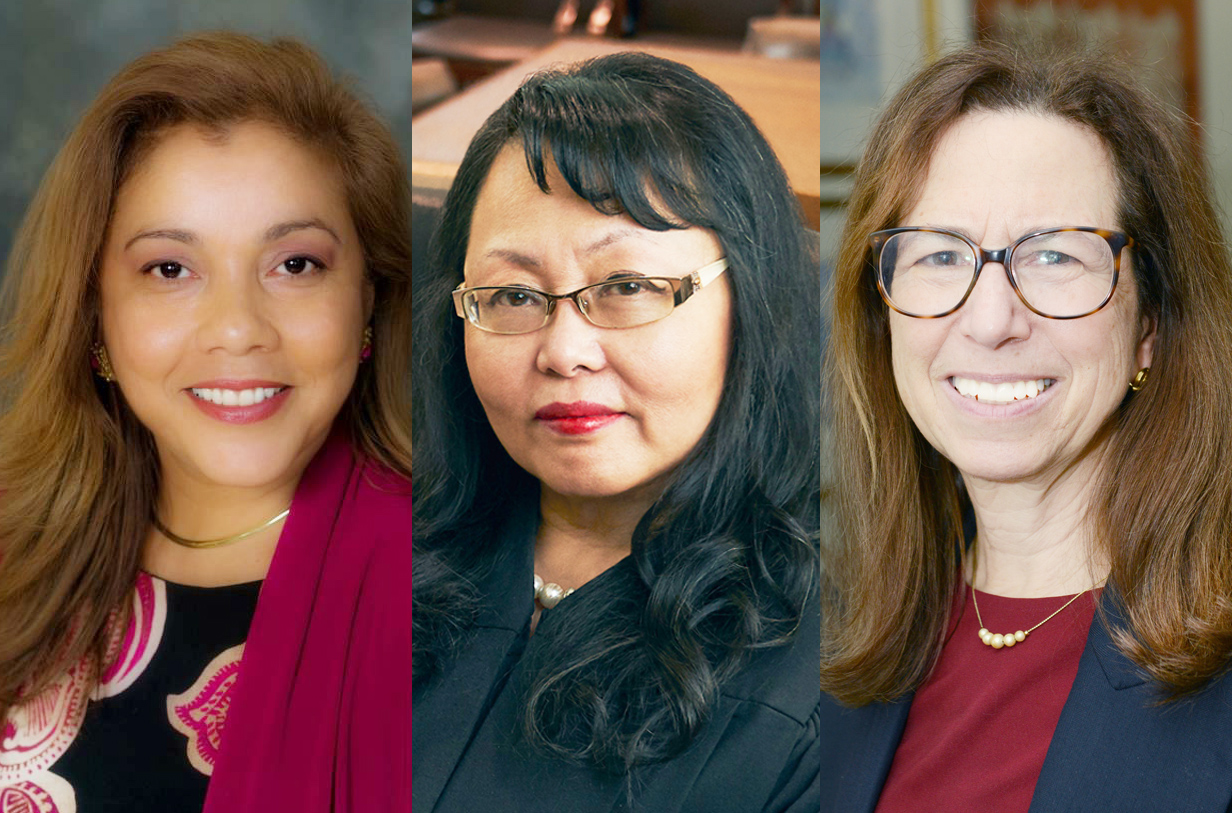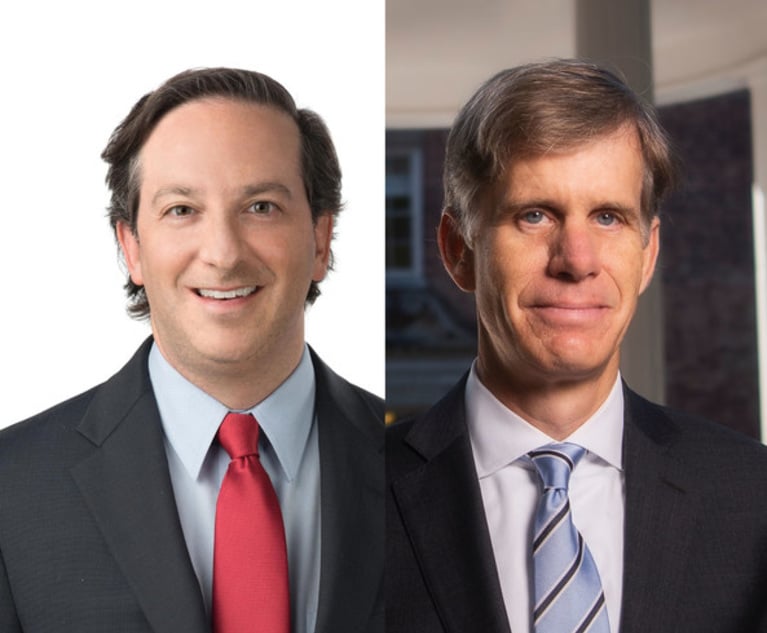Cases of Mistaken Identity: Female Judge in NY Told 'I'd Rather Wait for the Judge'
"After the third time, I kind of tapped my hand on the bench and said 'I am the judge!' His mouth dropped open. His eyes popped wide open," said Justice Sallie Manzanet-Daniels.
February 05, 2019 at 06:13 PM
6 minute read
The original version of this story was published on Daily Business Review
 From left, Justices Sallie Manzanet-Daniels; Doris Ling-Cohan and Ellen Gesmer (Photo of Doris Ling-Cohan by Shaoyi Zhang)
From left, Justices Sallie Manzanet-Daniels; Doris Ling-Cohan and Ellen Gesmer (Photo of Doris Ling-Cohan by Shaoyi Zhang)As was the custom, Justice Sallie Manzanet-Daniels wasn't wearing her robes because she didn't have a jury sitting that day. “How can I help you?” she asked.
“Really ma'am I don't want to be rude but I don't want to repeat myself when the judge comes down,” the lawyer replied.
She tried to make it clear to the lawyer that he was already dealing with the judge. “I would rather just wait for the judge,” he repeated.
“After the third time, I kind of tapped my hand on the bench and said 'I am the judge!' His mouth dropped open. His eyes popped wide open,” said Manzanet-Daniels who is now an appellate justice in Manhattan but was then a Civil Court judge.
“In the three decades that I have been in the business, I've seen great strides and great movement forward but it's still there and it needs to be called out every time it surfaces,” she said.
Even if it's subtle, she said it's important to expose stereotypes. Manzanet-Daniels, who is of Puerto Rican descent, said it's hard sometimes to tell whether she's being treated a certain way because of her gender or ethnicity. When she was a criminal defense attorney, for instance, she would often be mistaken for the interpreter.
Other times, she wondered whether lawyers didn't take her seriously because of her gender or because of her youth.
“If I made a ruling, I would sometimes get from the older attorneys the 'When I was in law school' kind of speech. I don't think male lawyers got the same kind of pushback,” she said.
Judges all over the country are sharing such stories since Michigan attorney Marie Reimers tweeted out her frustration over being confused for a paralegal Wednesday.
Texas Supreme Court Justice Eva Guzman could relate.
“This evening I was once again told, 'You don't look like a judge,'” Guzman wrote, prompting Michigan Judge Qiana Lillard to share a similar anecdote.
People tell me all the time I don't look like a judge even when I'm in my robe at official events
— Judge Qiana Lillard (@JudgeQLillard) January 31, 2019
Supreme Court Justice Doris Ling-Cohan, who serves on the Appellate Term, First Department in Manhattan and is of Asian descent, can relate.
“I remember as an attorney going into criminal court and I was the prosecutor and the judge asked me if I was an interpreter,” she said.
After Sept. 11 when she went through the downtown police blockade below Canal Street she had trouble getting through despite a police placard, a badge and her judge's ID.
“One day, my husband drives me to work, with me in the passenger seat, and the police not only do not bother asking him for ID but they run to lift the barricade for him,” she said.
Other times when representing clients, she was mistaken for the defendant. When she ran for election to the Supreme Court in 1995, she was frequently told she didn't look like a judge. “I have to fight through people's perceptions of what judges look like,” she said.
But some things have improved, she said. In the early 2000s when she was a Civil Court judge, she said, “I remember looking at this huge courtroom with hundreds of lawyers and there were no females. And that's changed.”
Certainly, that's true in the Appellate Division, First Department. Since Supreme Court Justice Ellen Gesmer was elevated to that court in 2016 along with two other colleagues, the First Department became more female than male.
“What I think happens that is more subtle is when I ask a question lawyers will adapt a condescending tone that I don't think they'd use with male colleagues,” she said. “My sense is there's a little more of that with women judges.”
When Gesmer was a young lawyer, she said the sexism was more overt. She would say something in a meeting and no one would respond. Yet. when a male lawyer would say the say thing later in the meeting, everyone would say what a good idea it was.
“I haven't had anything directly sexist in quite a while which I say with a caveat because some of it is stuff you get inured to,” she said.
She tells the story of letting her boss at legal services know that she was pregnant.
“He said, 'You're kidding.' I don't think it occurred to him that lawyers could get pregnant,” she said.
Retired Supreme Court Justice Emily Goodman told a humorous story in response to the recollections of the other judges.
“Over my three decades on the bench, I too, have been mistaken for everyone but the judge,” she said. “On the other hand, when my pre-K daughter came to court in the mid-eighties she told my male colleagues, 'I didn't know men could be judges.'”
Cori Rosen, an associate at Rosenberg & Estis who is on maternity leave with her second child, was returning to her Third Avenue office with her papers in a litigation bag. In the elevator, she encountered a lawyer who worked for another firm.
He asked her at which court transcription service did she work. When she said she wasn't a transcriber, he assumed that she was a legal secretary. She told him she was a litigator.
“There was no apology,” she said. “It was just awkward.”
Related story: Focus on Parkland Judge's Appearance, Not Jurisprudence, Seen as 'Disheartening', Women's Law Group Says
Related story:
This content has been archived. It is available through our partners, LexisNexis® and Bloomberg Law.
To view this content, please continue to their sites.
Not a Lexis Subscriber?
Subscribe Now
Not a Bloomberg Law Subscriber?
Subscribe Now
NOT FOR REPRINT
© 2025 ALM Global, LLC, All Rights Reserved. Request academic re-use from www.copyright.com. All other uses, submit a request to [email protected]. For more information visit Asset & Logo Licensing.
You Might Like
View All

On The Move: Ex-Partner Returns to Lead Nelson Mullins Corporate Group, Burr & Forman Hires University GC as COO
5 minute read
Law Firm Sued for Telemarketing Calls to Customers on Do Not Call Registry

Evidence Explained: Prevailing Attorney Outlines Successful Defense in Inmate Death Case
Trending Stories
- 1We the People?
- 2New York-Based Skadden Team Joins White & Case Group in Mexico City for Citigroup Demerger
- 3No Two Wildfires Alike: Lawyers Take Different Legal Strategies in California
- 4Poop-Themed Dog Toy OK as Parody, but Still Tarnished Jack Daniel’s Brand, Court Says
- 5Meet the New President of NY's Association of Trial Court Jurists
Who Got The Work
J. Brugh Lower of Gibbons has entered an appearance for industrial equipment supplier Devco Corporation in a pending trademark infringement lawsuit. The suit, accusing the defendant of selling knock-off Graco products, was filed Dec. 18 in New Jersey District Court by Rivkin Radler on behalf of Graco Inc. and Graco Minnesota. The case, assigned to U.S. District Judge Zahid N. Quraishi, is 3:24-cv-11294, Graco Inc. et al v. Devco Corporation.
Who Got The Work
Rebecca Maller-Stein and Kent A. Yalowitz of Arnold & Porter Kaye Scholer have entered their appearances for Hanaco Venture Capital and its executives, Lior Prosor and David Frankel, in a pending securities lawsuit. The action, filed on Dec. 24 in New York Southern District Court by Zell, Aron & Co. on behalf of Goldeneye Advisors, accuses the defendants of negligently and fraudulently managing the plaintiff's $1 million investment. The case, assigned to U.S. District Judge Vernon S. Broderick, is 1:24-cv-09918, Goldeneye Advisors, LLC v. Hanaco Venture Capital, Ltd. et al.
Who Got The Work
Attorneys from A&O Shearman has stepped in as defense counsel for Toronto-Dominion Bank and other defendants in a pending securities class action. The suit, filed Dec. 11 in New York Southern District Court by Bleichmar Fonti & Auld, accuses the defendants of concealing the bank's 'pervasive' deficiencies in regards to its compliance with the Bank Secrecy Act and the quality of its anti-money laundering controls. The case, assigned to U.S. District Judge Arun Subramanian, is 1:24-cv-09445, Gonzalez v. The Toronto-Dominion Bank et al.
Who Got The Work
Crown Castle International, a Pennsylvania company providing shared communications infrastructure, has turned to Luke D. Wolf of Gordon Rees Scully Mansukhani to fend off a pending breach-of-contract lawsuit. The court action, filed Nov. 25 in Michigan Eastern District Court by Hooper Hathaway PC on behalf of The Town Residences LLC, accuses Crown Castle of failing to transfer approximately $30,000 in utility payments from T-Mobile in breach of a roof-top lease and assignment agreement. The case, assigned to U.S. District Judge Susan K. Declercq, is 2:24-cv-13131, The Town Residences LLC v. T-Mobile US, Inc. et al.
Who Got The Work
Wilfred P. Coronato and Daniel M. Schwartz of McCarter & English have stepped in as defense counsel to Electrolux Home Products Inc. in a pending product liability lawsuit. The court action, filed Nov. 26 in New York Eastern District Court by Poulos Lopiccolo PC and Nagel Rice LLP on behalf of David Stern, alleges that the defendant's refrigerators’ drawers and shelving repeatedly break and fall apart within months after purchase. The case, assigned to U.S. District Judge Joan M. Azrack, is 2:24-cv-08204, Stern v. Electrolux Home Products, Inc.
Featured Firms
Law Offices of Gary Martin Hays & Associates, P.C.
(470) 294-1674
Law Offices of Mark E. Salomone
(857) 444-6468
Smith & Hassler
(713) 739-1250






